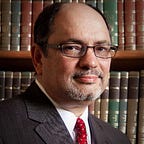History of Martin Luther King, Jr.
Born on January 15, 1929, we celebrate a holiday in honor of a man who was not a president, nor an explorer, nor a saint; rather he was a Baptist minister and an American leader of the 1960s civil rights movement who was named for the Protestant Reformer Martin Luther, after his father was inspired by a trip to Luther’s Wittenberg. Though President Carter awarded him the Presidential Medal of Freedom posthumously in 1977, it was not until 1986 that a day was established on the birthday of Martin Luther King, Jr. as a federal holiday.
The only other American federal holidays that honored individuals have been for Jesus, President Washington, and Christopher Columbus.
Pastor
Though King had an earned doctorate, he was also an ordained minister, the son, grandson, and great-grandson of Baptist ministers. From his biblical roots came many of the metaphors of his talks, the text of his presentations, and the cadence of his speech. He served as a minister starting in 1954 in Alabama, where afterward he led the boycott against segregation on buses that lasted 382 days. During this time he was arrested, his house was bombed, and he suffered personal abuse.
Activist
It was his involvement in the American Civil Rights Movement that gave him his greatest visibility, as he began in 1957 non-violent civil disobedience, not unlike Gandi‘s in India. Marches and protests were an effective means of accomplishing many of his goals. This culminated in 1963 with the “March on Washington for Jobs and Freedom” and his most famous speech, entitled “I Have A Dream” which he delivered at the Lincoln Memorial on the Mall in Washington, DC.
The following year, in 1964 he received the Nobel Peace Prize, the youngest recipient. Though initially successful in the South, King also brought his movement to the North, specifically Chicago in 1966, out of which grew equal opportunity programs.
Speaker
In 1967 King delivered a comprehensive statement against the Vietnam War in his speech in New York City’s Riverside Church entitled “Beyond Vietnam.” This was met with criticism from many activists and newspapers, though he argued that he was not merging the civil rights and peace movements.
Berkeley
Even so, he continued to speak out against the Vietnam War, and in 1967 he spoke in Sproul Plaza at the school I would later attend, the University of California at Berkeley where he told students:
“You, in a real sense, have been the conscience of the academic community and our nation. “
In 1968, King gave a prescient speech called “I’ve Been to the Mountaintop” in which he said about God that:
“He’s allowed me to go up to the mountain! And I’ve looked over, and I’ve seen the Promised Land. I may not get there with you. But I want you to know tonight, that we, as a people, will get to the Promised Land. And so I’m happy tonight. I’m not worried about anything. I’m not fearing any man. Mine eyes have seen the Glory of the coming of the Lord! “
The next day, on April 4, 1968, King was assassinated while standing on the balcony of his motel room in Memphis, Tennessee. National riots followed until five days later President Johnson declared a national day of mourning for King. 300,000 people attended his funeral. Since his death, King has become a symbol of protest in the pursuit of racial justice, as he said in his seminal speech “I Have A Dream” using majestic spiritual “soul force” rather than physical force.
As I write this from Colorado Springs on a snowy day, I am reminded of his charge at the end of that same speech:
“…from the snow-capped Rockies of Colorado… let freedom ring.“
Bill Petro, your friendly neighborhood historian
www.billpetro.com
If you enjoyed this article, please consider leaving a comment, or subscribing to the news feed to have future articles delivered to your feed reader, or to your email. Please hold down the clap button below to help others find it. The longer you hold it, the more claps you give!
